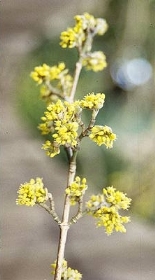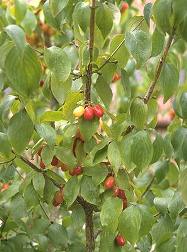Cornelian Cherry dogwood, Cornus mas, is the plant I have chosen for February's plant of the month. This particular dogwood is a plant that can be used as an indicator for the arrival of spring. This dogwood blooms in the late winter or very early in the spring, making this plant favored by many. It brings a little color to an otherwise drab winter environment. People always love the plants that are first to bloom in the spring because they show us that winter is coming to an end.
Early Spring Flowers
Cornelian cherry dogwood is a small tree or large shrub that blooms with tiny, beautiful, yellow flowers in late February or early March. These small flowers are formed in clusters all over the branches. Cornus mas is a plant that flowers before it has any leaves on it. The flowers are usually held on to the shrub for a few weeks before they drop and leaves appear. The leaves are a deep green with a slight point on the tip and veins that curve upward with the shape of the leaf. The pattern of their leaves is distinct for the dogwood family.
Cornus mas has interesting bark that exfoliates from the tree. This dogwood produces small, red, olive-shaped fruit in July and August that are not often noticed because they are hidden by the leaves. Cornus mas is relished by birds and other wildlife as a great food, which may make it hard to find the fruits. If you beat the birds to the fruits, they can be used to make tart jams and jellies.
The overall size of Cornelian cherry dogwood is up to 20 feet tall and wide; it can be trimmed from the ground level to make it look more like a tree. They can be used in your landscape as a specimen tree or in a grouping to make a hedge row. There are also many different varieties to choose from, including: 'Golden Glory', 'Spring Glow', and 'Variegata'.
Growing
This small tree or large shrub does best if planted in full sun but will tolerate some shade. Cornelian cherry dogwood will do well in our environment because it seems to have very little insect or disease problems and it can handle our cold winters. Cornus mas prefers to grow in well drained soils with high organic matter but will tolerate the less desirable clay soils found in much of southeastern Nebraska. This is a plant that can tolerate some tough growing conditions, so it should grow very well in most any landscaping setting. Try one on your acreage for something different and to have the plant that heralds spring, to end our cold winter.


